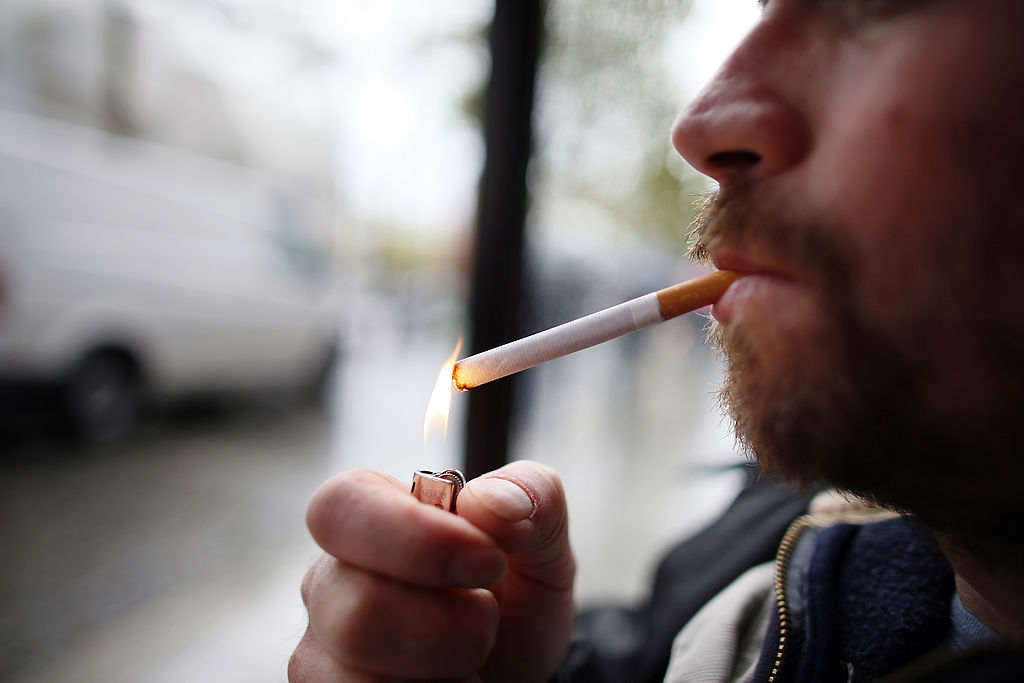Cigarette sales had a COVID comeback


A free daily email with the biggest news stories of the day – and the best features from TheWeek.com
You are now subscribed
Your newsletter sign-up was successful
Old habits die hard (especially during a chaotic, life-changing pandemic).
Cigarette sales rose for the first time in 20 years last year, leading some to believe "pandemic-related stress spurred an uptick in smoking," writes The Washington Post, according to a report released by the Federal Trade Commission.
The largest U.S. cigarette producers sold "an estimated 203.7 billion cigarettes to wholesalers and retailers in 2020, representing an increase of about 800 million over 2019," per the Post. The Journal qualifies that 2019-to-2020 increase at 0.4 percent.
The Week
Escape your echo chamber. Get the facts behind the news, plus analysis from multiple perspectives.

Sign up for The Week's Free Newsletters
From our morning news briefing to a weekly Good News Newsletter, get the best of The Week delivered directly to your inbox.
From our morning news briefing to a weekly Good News Newsletter, get the best of The Week delivered directly to your inbox.
Altria Group, which makes Marlboro cigarettes, had previously attributed the increase to the pandemic, reports The Wall Street Journal. In a July 2020 earnings call, Altria Group CEO Billy Gifford told investors that "fewer social engagements allow for more tobacco-use occassions," per the Post.
The FTC data is "very troubling," Erika Sward, assistant vice president of advocacy for the American Lung Association, told the Post. Like the Altria Group, she also attributed the increase in sales to the pandemic, considering the effect stress has on smokers past and present.
Tobacco executives believe stimulus checks and enhanced unemployment benefits could have played into the rise, as well, as "lower-income smokers have been able to buy in bulk when they go to the store," writes the Post. And that's without mentioning the influence that bans on flavored vaping and increased e-cigarette taxes may have had on pushing smokers back toward traditional cigarettes, notes the Journal.
It is, however, unclear if the uptick was as a result of new smokers, relapses, or increased intake among existing smokers.
A free daily email with the biggest news stories of the day – and the best features from TheWeek.com
One analyst told the Post it is "too soon to tell whether the same trend continued into 2021."
Brigid Kennedy worked at The Week from 2021 to 2023 as a staff writer, junior editor and then story editor, with an interest in U.S. politics, the economy and the music industry.
-
 Political cartoons for February 7
Political cartoons for February 7Cartoons Saturday’s political cartoons include an earthquake warning, Washington Post Mortem, and more
-
 5 cinematic cartoons about Bezos betting big on 'Melania'
5 cinematic cartoons about Bezos betting big on 'Melania'Cartoons Artists take on a girlboss, a fetching newspaper, and more
-
 The fall of the generals: China’s military purge
The fall of the generals: China’s military purgeIn the Spotlight Xi Jinping’s extraordinary removal of senior general proves that no-one is safe from anti-corruption drive that has investigated millions
-
 ‘One Battle After Another’ wins Critics Choice honors
‘One Battle After Another’ wins Critics Choice honorsSpeed Read Paul Thomas Anderson’s latest film, which stars Leonardo DiCaprio, won best picture at the 31st Critics Choice Awards
-
 Son arrested over killing of Rob and Michele Reiner
Son arrested over killing of Rob and Michele ReinerSpeed Read Nick, the 32-year-old son of Hollywood director Rob Reiner, has been booked for the murder of his parents
-
 Rob Reiner, wife dead in ‘apparent homicide’
Rob Reiner, wife dead in ‘apparent homicide’speed read The Reiners, found in their Los Angeles home, ‘had injuries consistent with being stabbed’
-
 Hungary’s Krasznahorkai wins Nobel for literature
Hungary’s Krasznahorkai wins Nobel for literatureSpeed Read László Krasznahorkai is the author of acclaimed novels like ‘The Melancholy of Resistance’ and ‘Satantango’
-
 Primatologist Jane Goodall dies at 91
Primatologist Jane Goodall dies at 91Speed Read She rose to fame following her groundbreaking field research with chimpanzees
-
 Florida erases rainbow crosswalk at Pulse nightclub
Florida erases rainbow crosswalk at Pulse nightclubSpeed Read The colorful crosswalk was outside the former LGBTQ nightclub where 49 people were killed in a 2016 shooting
-
 Trump says Smithsonian too focused on slavery's ills
Trump says Smithsonian too focused on slavery's illsSpeed Read The president would prefer the museum to highlight 'success,' 'brightness' and 'the future'
-
 Trump to host Kennedy Honors for Kiss, Stallone
Trump to host Kennedy Honors for Kiss, StalloneSpeed Read Actor Sylvester Stallone and the glam-rock band Kiss were among those named as this year's inductees
